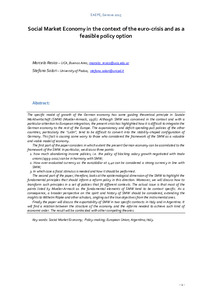Por favor, use este identificador para citar o enlazar este ítem:
https://repositorio.uca.edu.ar/handle/123456789/14635| Título: | Social Market Economy in the context of the euro-crisis and as a feasible policy option | Autor: | Resico, Marcelo Fernando Solari, Stefano |
Palabras clave: | ECONOMIA SOCIAL DE MERCADO; UNION EUROPEA; Argentina; Italia; POLITICA ECONOMICA | Fecha de publicación: | 2015 | Cita: | Resico, M.F., Solari, S. Social Market Economy in the context of the euro-crisis and as a feasible policy option [en línea]. En: 27th European Association for Evolutionary Political Economy Annual Conference "A New Role for the Financial System”: 17-19 de septiembre. Génova: Universidad de Génova, 2015 Disponible en: https://repositorio.uca.edu.ar/handle/123456789/14635 | Resumen: | Abstract: The specific model of growth of the German economy has some guiding theoretical principle in Soziale Marktwirtschaft (SMW) (Mueller-Armack, 1956). Although SMW was conceived in the context and with a particular attention to European integration, the present crisis has highlighted how it is difficult to integrate the German economy to the rest of the Europe. The expansionary and deficit-spending-pull policies of the other countries, particularly the “Latin”, tend to be difficult to convert into the stability-shaped configuration of Germany. This fact is causing some worry to those who considered the framework of the SMW as a valuable and viable model of economy. The first part of the paper considers in which extent the present German economy can be assimilated to the framework of the SMW. In particular, we discuss three points: 1. how much abandoning income policies, i.e. the policy of blocking salary growth negotiated with trade unions (1999-2011) can be in harmony with SMW; 2. How over-evaluated currency as the euro/dollar at 1,40 can be considered a strong currency in line with SMW; 3. In which case a fiscal stimulus is needed and how it should be performed. The second part of the paper, therefore, looks at the epistemological dimension of the SMW to highlight the fundamental principles that should inform a reform policy in this direction. Moreover, we will discuss how to transform such principles in a set of policies that fit different contexts. The actual issue is that most of the points listed by Mueller-Armack as the fundamental elements of SMW tend to be context specific. As a consequence, a broader perspective on the spirit and history of SMW should be considered, extending the insights to Wilhelm Röpke and other scholars, singling out the true objectives from the instrumental ones. Finally the paper will discuss the exportability of SMW in two specific contexts: in Italy and in Argentina. It will find a relation between the structure of the economy and the reforms needed to achieve such kind of economic order. The result will be contrasted with other competing theories. | URI: | https://repositorio.uca.edu.ar/handle/123456789/14635 | Disciplina: | ECONOMIA | Derechos: | Acceso abierto | Fuente: | 27th European Association for Evolutionary Political Economy Annual Conference "A New Role for the Financial System”: 17-19 de septiembre. Génova: Universidad de Génova, 2015 |
| Aparece en las colecciones: | Ponencias |
Ficheros en este ítem:
| Fichero | Descripción | Tamaño | Formato | |
|---|---|---|---|---|
| social-market-economy-context.pdf | 532,05 kB | Adobe PDF |  Visualizar/Abrir |
Visualizaciones de página(s)
47
comprobado en 27-abr-2024
Descarga(s)
19
comprobado en 27-abr-2024
Google ScholarTM
Ver en Google Scholar
Este ítem está sujeto a una Licencia Creative Commons

